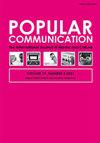In rhetorical sense(s): exploration of difference reflected through Black Mirror
IF 1.8
Q2 COMMUNICATION
引用次数: 0
Abstract
ABSTRACTThis article attempts to expand the world in which rhetorical scholarship exists in general, and the positionality and subjectivity of the rhetorical scholar who engages in theory building specifically. Aiming to create a decolonial space to imagine a better world, I explore the tempo-spatial opening between epistemology and subjectivity as the space to realize our ontological potential. I employ the conception of Otherwise—those different ways of knowing and being – in order to enter into and grapple with this liminal space. An episode of the Netflix series, Black Mirror was used both to analyze and to illuminate one way in which rhetorical scholars can engage in liberatory rhetorical theorizing. This article, thus, ultimately offers a different way of thinking and being rhetorical scholars.KEYWORDS: DecolonizationsubjectivitydifferenceBlack Mirrorobjectivityliminality Disclosure statementNo potential conflict of interest was reported by the author(s).Additional informationNotes on contributorsAkie Fukushige WenkAkie Fukushige Wenk, PhD, Department of Communication Studies at Louisiana State University, Baton Rouge LA embraces an interdisciplinary approach to her scholarship, and her research interests range from decolonial scholarship to liberatory pedagogy, from the rhetoric of race to interracial friendships.在修辞意义上:探讨《黑镜》所反映的差异
摘要本文试图拓展修辞学总体存在的世界,以及修辞学学者从事理论建设的具体位置性和主体性。我的目标是创造一个非殖民化的空间来想象一个更美好的世界,我探索认识论和主体性之间的时空开放,作为实现我们本体论潜力的空间。我运用“否则”的概念——那些认识和存在的不同方式——来进入并与这个有限的空间搏斗。Netflix电视剧《黑镜》中的一集被用来分析和阐明修辞学家从事解放修辞理论化的一种方式。因此,本文最终提供了一种不同的思维方式和修辞学者。关键词:非殖民化、主观性差异、黑镜、客观性、局限性披露声明作者未报告潜在的利益冲突。sakie Fukushige Wenk,博士,路易斯安那州立大学传播研究系,巴吞鲁日,LA拥抱跨学科的方法来研究她的奖学金,她的研究兴趣从非殖民奖学金到解放教育学,从种族修辞到种族间的友谊。
本文章由计算机程序翻译,如有差异,请以英文原文为准。
求助全文
约1分钟内获得全文
求助全文

 求助内容:
求助内容: 应助结果提醒方式:
应助结果提醒方式:


